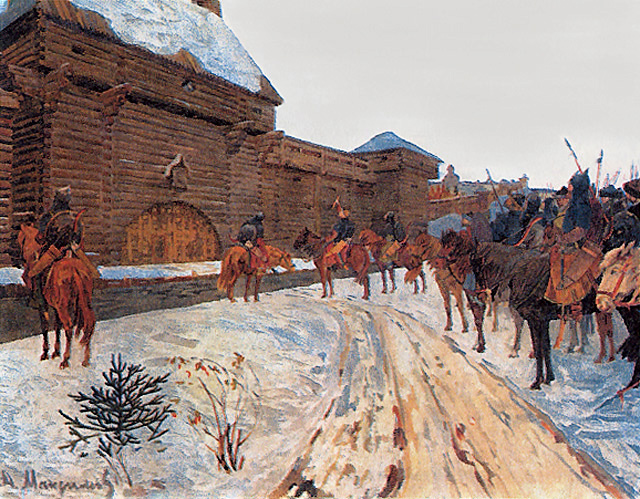|
Antonina Abarinova
Antonina Ivanovna Abarinova (russian: Антони́на Ива́новна Аба́ринова, 24 July 1842, Vladimir – 29 July 1901, Sukhodol, Tula Governorate, Imperial Russia) was a Russian Empire opera singer (originally contralto, later mezzo-soprano) who performed at Maryinsky Theatre, while being also an Alexandrinsky Theatre actress.Russian Drama Theatre. Encyclopedia. 2001, p. 568 // Русский драматический театр: Энциклопедия / Большая Российская энциклопедия, 2001. — 568 с.: ил. Abarinova's best-known operatic roles were as the Princess in ''Rusalka'' and Laura in '' The Stone Guest'', both by Alexander Dargomyzhsky, as well as Spiridonova in Alexander Serov's '' The Power of the Fiend'' and Lady Pamela in Daniel Auber's '' Fra Diavolo''. In theatre she excelled as Natalya Dmitriyevna in Alexander Griboyedov's '' Woe from Wit'', Zvezdintseva in ''The Fruits of Enlightenment'' by Leo T ... [...More Info...] [...Related Items...] OR: [Wikipedia] [Google] [Baidu] |
Vladimir (city)
Vladimir ( rus, Влади́мир, p=vlɐ'dʲimʲɪr, a=Ru-Владимир.ogg) is a city and the administrative center of Vladimir Oblast, Russia, located on the Klyazma River, east of Moscow. It is served by a railway and the M7 motorway. Population: History Vladimir was one of the medieval capitals of Russia, with significant buildings surviving from the 12th century. Two of its Russian Orthodox cathedrals, a monastery, and associated buildings have been designated as among the White Monuments of Vladimir and Suzdal, a UNESCO World Heritage Site. In the past, the city was also known as Vladimir-on-Klyazma () and Vladimir-Zalessky (), to distinguish it from another Vladimir in Volhynia (modern Ukraine). Foundation The founding date of Vladimir is disputed between 990 and 1108. In the ''Novgorod First Chronicle'', Vladimir is mentioned under the year 1108, and during the Soviet period, this year was decreed to be its foundation year with the view that attributes the foun ... [...More Info...] [...Related Items...] OR: [Wikipedia] [Google] [Baidu] |
The Fruits Of Enlightenment
''The Fruits of Enlightenment'', aka ''Fruits of Culture'' (1889-90, pub. 1891) is a play by the Russian writer Leo Tolstoy. It satirizes the persistence of unenlightened attitudes towards the peasants amongst the Russian landed aristocracy. In 1891 Constantin Stanislavski achieved success when he directed the play for his Society of Art and Literature organization. Tolstoy created the first, incomplete draft of the play in 1886, along with ''The Power of Darkness''. Three years later, his children and wife persuaded him to complete the manuscript sufficiently for a house performance in Yasnaya Polyana. Tolstoy initially denied the proposal but quickly took the lead in directing the amateur actors; the cast included twenty six of his children, two nieces, a court prosecutor from Tula and a judge from Moscow. This first performance was on 30 December 1889. According to Sergei Tolstoy, the 1889 play deliberately reflected the realities of Yasnaya Polyana and the neighboring country e ... [...More Info...] [...Related Items...] OR: [Wikipedia] [Google] [Baidu] |
19th-century Actresses From The Russian Empire
The 19th (nineteenth) century began on 1 January 1801 ( MDCCCI), and ended on 31 December 1900 ( MCM). The 19th century was the ninth century of the 2nd millennium. The 19th century was characterized by vast social upheaval. Slavery was abolished in much of Europe and the Americas. The First Industrial Revolution, though it began in the late 18th century, expanding beyond its British homeland for the first time during this century, particularly remaking the economies and societies of the Low Countries, the Rhineland, Northern Italy, and the Northeastern United States. A few decades later, the Second Industrial Revolution led to ever more massive urbanization and much higher levels of productivity, profit, and prosperity, a pattern that continued into the 20th century. The Islamic gunpowder empires fell into decline and European imperialism brought much of South Asia, Southeast Asia, and almost all of Africa under colonial rule. It was also marked by the collapse of ... [...More Info...] [...Related Items...] OR: [Wikipedia] [Google] [Baidu] |

